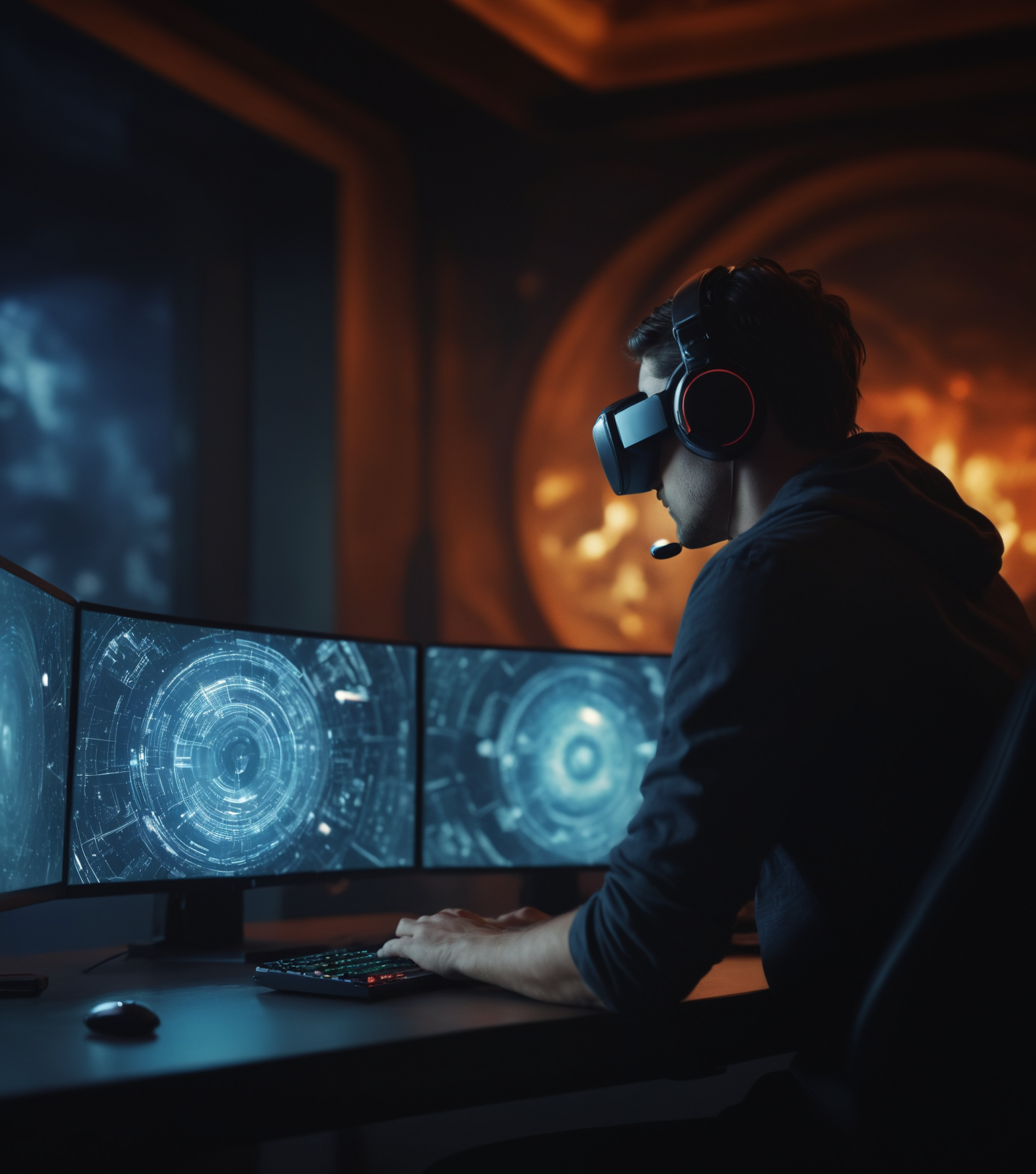
The Metaverse Endgame: 2024 Edition

Back in September, 2021 when I wrote the first edition of The Metaverse Endgame, my first-ever published article, I had no idea the article would catapult me into a full-time career in Web3 that has now spanned two years.
In that time, I've done a ton.
I've worked at Wilder World, The Sandbox, Zero, Cultivate, Blockworks, and more, gaining tremendous insider access to the teams dedicated to helping shape the metaverse future.
My knowledge and perspective on the subject have evolved greatly since joining Web3 professionally, so much so that, upon rereading the first edition (which, given my growth as a writer, I now find hard to read), I decided to produce an updated version.
This is my revised take on where all this Web3 stuff leads to.
0-1
The metaverse isn't real, yet. Today, we sit at 0. We have a kitchen table with puzzle pieces scattered across. We can reasonably see the end result but don't yet know how to put it all together.
Various teams across the world are focusing on a mission that, whether they know it or not, is contributing to the construction of the metaverse. All projects dedicated to emerging technologies—blockchain, AI, AR/VR/MR, etc.—are pulling in the same direction. All roads ultimately lead to the metaverse where everything comes together and we reach 1.
1 presents an exciting, but daunting future. Here are some my predictions.
Screen time under 10 hours a day becomes abnormal
The metaverse will engrain technology further into the everyday life of humans, blurring the lines between our physical and virtual realities through the widespread usage of wearables like Apple Glasses.

We already live lives where our personal information generates trillions of dollars for large tech corporations. These next-gen wearables will bring us into a new reality where these corporations expand their influence further across all five senses, with sight being the most prominent. Whether an individual is doing laundry, shopping for groceries, lifting weights, or exploring Manhattan, a screen will be centimeters from their eyes, overlaying digital items (notifications, directions, video calls, ads) across their field of vision.
For many, screen time will begin the moment they wake up and only end once it's time to sleep again.
Everyone is getting the chip. Yes, THAT chip.
We live in a hyper-competitive world. With companies like Elon Musk's Nueralink working to launch brain chips that "unlock human potential tomorrow," everyone in the world is going to be presented with two options once a viable product is widely available:
- Get the chip and become an enhanced human being, capable of far more than ever before.
- Fall drastically far behind everyone who gets the chip.
Companies will hire chipped humans much more favorably (potentially leading to no-chip discriminatory legislation being enacted to protect unmodified humans) because they'll be able to produce a much higher output. Chipped business owners will lead their companies more successfully than unmodified owners. Athletes, gamers, and politicians will all get chipped to maintain their edge.
With humanity chipped, the metaverse will take a giant leap forward...
The virtual world will no longer feel virtual
We're all plugging our brains into the metaverse. Chips will connect our senses to virtual worlds, experiences, and games. With the metaverse already visually fully photorealistic when we start plugging in, this will generate full-blown simulations that are indistinguishable from reality. It will truly become a Ready Player One existence.
As you explore a virtual city, you'll feel the raindrops falling across your skin. You'll head to a virtual resort and taste the finest foods, smell the salty ocean air, and feel the sweat pouring out of your body in the sauna.
Esports will skyrocket in popularity. Men will date AI-powered NPC women virtually. Users will upload memory files to relive later. The metaverse economy will grow ever closer to competing with the real-world global economy.

The negative consequences that could arise from this are abundant. Simulations could hurt our ability to connect in the real world, lead to severe population decline, hurt the availability of physical resources and the upkeep of our cities and towns as the virtual world is increasingly prioritized, and even damage our ability to properly grieve lost loved ones or ended relationships.
Remote work dominates
I've been working remotely for the past two years and it is, without a doubt, superior to working in an office. I have full autonomy to manage my time, enabling me to work on several different projects simultaneously. I'm able to go to the gym whenever I want, take my dog for a walk as I please, and have full access to my own private office, home refrigerator, and bed (should I need a quick 20-minute nap to reboot the brain).
No one is barging into my office to interrupt my work. I'm not wasting time with a commute to work. I can get chores like laundry done as I work.
I could go on and on. Efficiency, freedom, and comfort are the primary themes.
The main criticism I've seen people express towards remote work is that they lose the "human connection." The metaverse will remove that barrier, as people will be able to plug into a simulation and work in a virtual office that feels entirely real—they'll be shaking hands and attending holiday parties just like in real life.
The impact this shift will have on the world will be profound, especially when it comes to our cities. Real estate (commercial and residential) in cities will decline greatly in value as people head to more comfortable suburban environments to live. Cities will evolve to be greener, brighter, more attractive spaces without the hustle and bustle that today's abundance of office space brings.

The Builders
The metaverse can't exist without the teams worldwide contributing to building it, most notably, the teams creating what I refer to as "Metaverse Platforms," which will rise to power by successfully creating, growing, and shepherding massive virtual ecosystems of worlds. The largest of these ecosystems will contain thousands of worlds, all connected in one persistent MMO experience run on blockchain technology.
In the Ready Player One storyline, Gregarious Simulation Systems (GSS), the company that built the OASIS, is an example of what Metaverse Platforms could become.
As I've dug deeper into the concept of Metaverse Platforms, I've come to realize that the metaverse endgame isn't about just creating a massive virtual world and releasing it for the masses.
In actuality, the few Metaverse Platform companies that rise to the top will be primarily dedicated to the sale and maintenance of productized simulations that people connect to through their brains.
Imagine you're Disney and the goal is to build an immersive virtual Star Wars universe featuring the planets, characters, vehicles, etc. from the movies. Disney will go to a Metaverse Platform company and purchase everything they need to produce that universe in a neatly packaged toolbox. Very quickly, they'll be able to launch playable experiences, a digital token that powers the ecosystem, a governance structure, and much more.

I expect that, by 2040, anyone looking at the list of the top 20 organizations in the world will see 3-4 dedicated to the sale and maintenance of such productized simulations.
There are two related topics that I find particularly interesting...
Testing Grounds
With the arrival of simulations, humanity stands to gain tremendously. Although, yes, many will be used purely for entertainment, others will serve as proving grounds for new advancements. Using real players, AI-powered NPCs, or a mix, a simulation could test products before ever creating a physical version, evacuation routes for a city, the impact of various governmental legislation, military strategies, and so much more.
AI Worlds
It's already entirely feasible to have a virtual world filled with players transacting in cryptocurrency, but what if every character was a sentient AI that didn't know it was living in a simulation?
This will very likely ultimately be feasible, and it will enable anyone to effectively play God as the simulation overlord and pull strings as they please. Assuming these worlds could be linked, we'd arrive at the point that humanity has created its own virtual multiverse filled with billions, even trillions, of sentient beings.

I've only just begun to mentally scratch the surface of what the consequences of this could be.
It's scary.
Embracing the Future
The future of the metaverse goes beyond mere digital interaction; it envisages a new reality where the boundaries between the physical and virtual blur, reshaping human experience and societal norms. The advancements in AI, blockchain, and AR/VR/MR technologies are not just building blocks of this new world, but catalysts for a paradigm shift in everything from our daily routines to how we work, socialize, and even perceive reality itself.
However, with these possibilities come significant ethical, social, and psychological challenges. The prospect of a world where screen time dominates every aspect of life, where brain chips enhance human capabilities, and where virtual realities are indistinguishable from the physical, raises questions about the impact on human connection, mental health, and the very essence of what it means to be human.

As we embrace this brave new world, it becomes imperative to navigate these challenges with caution, ensuring that the metaverse enhances rather than diminishes the human experience. The success of the metaverse will depend not just on technological innovation, but on our ability to balance progress with the preservation of the core values that define us as a society.
Maintaining an open, decentralized metaverse rather than one controlled by centralized corporations is absolutely paramount to achieving this success.







